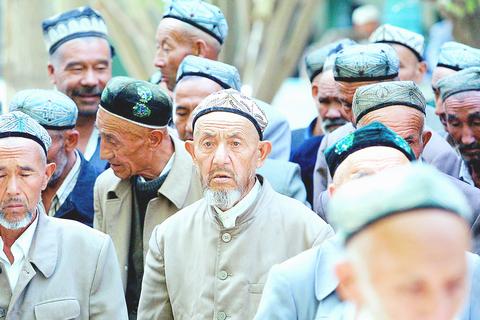As the sun sets, a streetside butcher lays out his prayer mat and bows to Mecca. The sizzle of roasting kebabs fills the air. Women hidden under brown veils haggle with vendors over pomegranates.
But dark tensions also lurk on these peaceful, if frenetic, streets of Kashgar, an oasis in China's rugged far west. Uighurs, the city's Muslim people, talk of arrests by Chinese security forces. Plainclothes agents keep watch. The shrill yells of drilling soldiers pierce the dusk.
Now, complicating this volatile mix, come the aftershocks of the Sept. 11 terror attacks in the US. Nowhere do the attacks and their aftermath threaten to be more destabilizing for China than in its western region of Xinjiang bordering Afghanistan, where Chinese communism meets Muslim tradition with sometimes violent consequences.

PHOTO: AP
Skepticism sharpens divisions
Many Kashgar Muslims are skeptical of US allegations that Osama bin Laden and his radical Islamic followers were responsible for the attacks. Others say they want to see proof of the Saudi-born suspect's involvement before the US retaliates against his protectors, the Taliban rulers of Afghanistan.
"The Americans are talking rubbish when they say they know who did it. They don't know. None of us know," said Amaijan, a Uighur who uses just one name. He runs a stall selling greeting and invitation cards, including one that features New York's World Trade Center before it was destroyed.
Such skepticism could sharpen divisions between Uighurs and Beijing as Chinese leaders back the international crackdown on terrorism. Supporting Washington against bin Laden and the Taliban risks alienating Uighurs who already resent Beijing's heavy-handed rule and migration into Xinjiang by Han Chinese, China's dominant ethnic group.
"We are Muslims. The Afghans are Muslims. Of course, we don't want to see Muslims being attacked," said Mamiti, who sells copperware. "But there's nothing we can do -- the Han control us like this," he said, making a fist. "If we speak out, they arrest us."
China has qualified its support for Washington by saying that strikes should be carefully targeted against proven terrorists, avoiding innocent casualties. It also wants the UN Security Council, where China has veto power as a permanent council member, to be involved.
Benefits for Beijing
But Beijing also stands to benefit from possible US attacks against Afghan terrorist training camps. Uighur militants who occasionally carry out bombings, attacks and assassinations against Chinese rule in Xinjiang have received military training and inspiration from Afghanistan.
Besides a drop in foreign tourists in the wake of Sept. 11, there is little overt tension on Kashgar's busy streets and in its narrow alleys. The faithful still fill mosques, bazaars bustle with the cries of vendors selling carpets from central Asia, saffron from Iran and henna from India.
But to keep out unrest, Islamic zealotry and any refugees, Beijing has stationed extra soldiers and tightened checkpoints in the mountains that form Xinjiang's frontier with Afghanistan and Pakistan -- 90km south of Kashgar.
Human rights campaigners fear China will use the Sept. 11 attacks to justify or intensify its years-long campaign to crush Uighur separatists. Scholars expect China, Russia and four central Asian states that have teamed up against terrorism and religious extremism to share intelligence and work more closely.
"There are always tensions between Han and Uighurs. Every five or 10 years they make trouble, we round them up and shoot a few. Then they don't make trouble anymore," said Li Chengjia, who moved to Xinjiang four decades ago as a soldier and now drives a taxi in Kashgar.
"There's a lot of us Han, but only a few of them Uighurs," Li said. "They've got to accept our rule."
China is also using economic development to tie Xinjiang closer to the rest of the country. A rail link to Kashgar opened two years ago. People's Square in central Kashgar has a new Bank of China building to go with its giant statue of revolutionary leader Mao Tse-tung.
Islamic radicalism
"There's a large group of Uighurs who are very happy to be part of China and have seen what's happened in Central Asia -- the economic problems, the civil war in Tajikistan, the problems with Islamic radicalism," said Dru Gladney, an expert on China's Muslims at the University of Hawaii.
"Many of them are saying: We've got problems here in Xinjiang, but it could be a lot worse."

US PUBLICATION: The results indicated a change in attitude after a 2023 survey showed 55 percent supported full-scale war to achieve unification, the report said More than half of Chinese were against the use of force to unify with Taiwan under any circumstances, a survey conducted by the Atlanta, Georgia-based Carter Center and Emory University found. The survey results, which were released on Wednesday in a report titled “Sovereignty, Security, & US-China Relations: Chinese Public Opinion,” showed that 55.1 percent of respondents agreed or somewhat agreed that “the Taiwan problem should not be resolved using force under any circumstances,” while 24.5 percent “strongly” or “somewhat” disagreed with the statement. The results indicated a change in attitude after a survey published in “Assessing Public Support for (Non)Peaceful Unification

The CIA has a message for Chinese government officials worried about their place in Chinese President Xi Jinping’s (習近平) government: Come work with us. The agency released two Mandarin-language videos on social media on Thursday inviting disgruntled officials to contact the CIA. The recruitment videos posted on YouTube and X racked up more than 5 million views combined in their first day. The outreach comes as CIA Director John Ratcliffe has vowed to boost the agency’s use of intelligence from human sources and its focus on China, which has recently targeted US officials with its own espionage operations. The videos are “aimed at

‘MISGUIDED EDICT’: Two US representatives warned that Somalia’s passport move could result in severe retaliatory consequences and urged it to reverse its decision Minister of Foreign Affairs Lin Chia-lung (林佳龍) has ordered that a special project be launched to counter China’s “legal warfare” distorting UN Resolution 2758, a foreign affairs official said yesterday. Somalia’s Civil Aviation Authority on Wednesday cited UN Resolution 2758 and Mogadishu’s compliance with the “one China” principle as it banned people from entering or transiting in the African nation using Taiwanese passports or other Taiwanese travel documents. The International Air Transport Association’s system shows that Taiwanese passport holders cannot enter Somalia or transit there. The Ministry of Foreign Affairs (MOFA) protested the move and warned Taiwanese against traveling to Somalia or Somaliland

Four former Hong Kong opposition lawmakers jailed in the territory’s largest national security case were released yesterday after more than four years in prison, the first among dozens convicted last year to regain their freedom. Former legislators Claudia Mo (毛孟靜), Jeremy Tam (譚文豪), Kwok Ka-ki (郭家麒) and Gary Fan (范國威) were part of a group of 47 public figures — including some of Hong Kong’s best-known democracy advocates — who were charged with subversion in 2021 for holding an informal primary election. The case fell under a National Security Law imposed on the territory by Beijng, and drew international condemnation and warnings